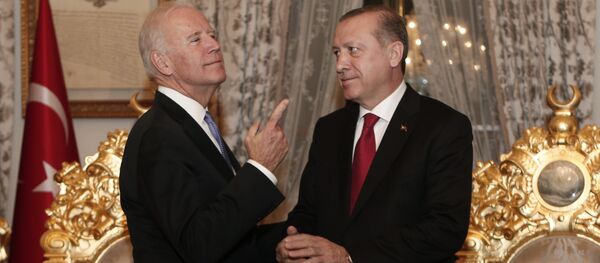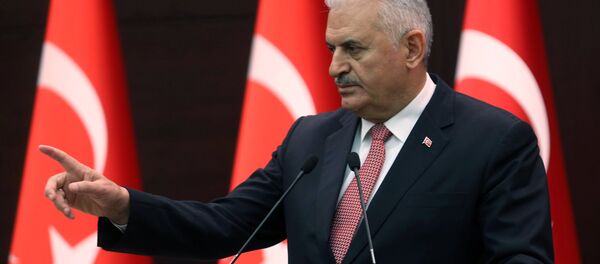On Monday, a delegation of four US experts, including three representatives of the US Department of Justice and an official from the State Department, arrived in the Turkish capital to discuss the extradition of Turkish preacher Fethullah Gulen to Turkey ahead of Biden's Wednesday visit. Ankara has accused the Islamic preacher and billionaire 'philanthropist', who resides in a small community in rural Pennsylvania, of being behind the failed coup attempt which rocked Turkey last month.
Speaking to Sputnik Turkey about the prospects of Washington actually handing Gulen over to Turkish authorities, Dr. Ilhan Uzgel, a political scientist and expert in foreign relations at Ankara University, suggested that the US will not extradite Gulen unless the country's leaders find it in their interest to do so. Specifically, the issue revolves around whether Washington sees any interest in keeping Gulen around in the US any longer or not.
"Right now," Uzgel said, "Gulen is a trump card in Washington's hand. Turkey has demanded the preacher's extradition so forcefully that the US may very well try to use it as a bargaining chip. In other words, even if Gulen, for whatever reason, were to fall from Washington's good graces, America would not extradite him before trying to bargain with Turkey."
Effectively the political scientist noted that "if the US no longer finds it in their interest – if Gulen, in their opinion, has served his purpose, Washington can hand him over to Ankara, or send him to some other country."
Uzgel added that "for now it is difficult to talk about anything with certainty. The end result depends entirely on the kinds of relations linking the United States with the Gulen movement. Moreover, this is not an issue that affects only Turkey, since the activities of Gulen's organization are not limited to Turkish territory."
The second major topic of discussion will be the situation in Syria, according to the expert. "There, Daesh are either defending or on the retreat, while Damascus continues to build its strength, and has maintained control over much of the country. In addition, there is also a question about the fate of the so-called 'Kurdish corridor'. These points need to be discussed."
"Incirlik has a symbolic value," Uzgel noted, "one that confirms the relationship between Turkey and the US, as well as well as Turkey's position in NATO and in the West. In this sense, opening the base to Russia would be a confirmation that Turkey is 'changing direction' – something that would cause significant concern in the West. I don't think the Turkish government will take this step, at least in the current conditions; doing so might effectively sever the ties between Turkey and the West."
Returning to the Syrian question, Uzgel noted that he could not emphasize enough just how much Turkey's previous Syrian policy had "driven Ankara into a corner." Now, he noted, "the country is reaping the consequences. If Ankara cooperates with the US, it will put it at odds with Russia and Damascus. But we also know that the US is no longer so interested in Assad's departure as it has been before. Most likely, they have reached an agreement with Russia on this issue."
In other words, the analyst noted, "the US is carrying out a policy in the region according to which, on the one hand, they support Turkey, but on the other, they support the Democratic Union Party as well. It's hard to predict how long this policy will continue. The Syrian Kurds too are in a difficult position. The US is very far away, they have no support from Turkey, unlike in Iraq, where [Iraqi Kurdish leader] Masoud Barzani has agreed to cooperate with Ankara."
In any case, "Ankara's position toward the Syrian Kurds will only soften once the Kurdish issue inside Turkey itself is resolved," Uzgel concluded.





